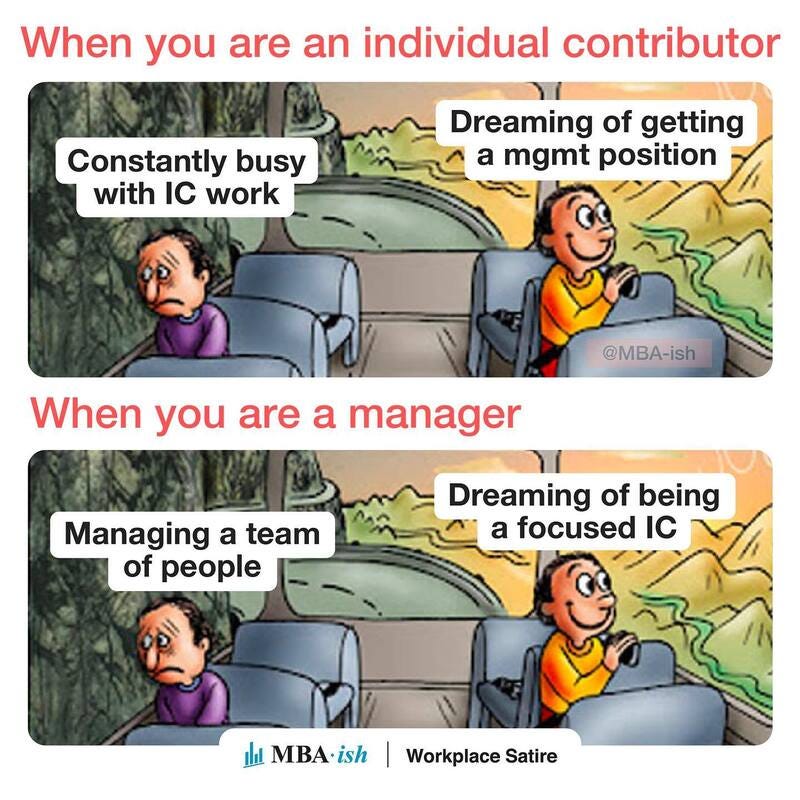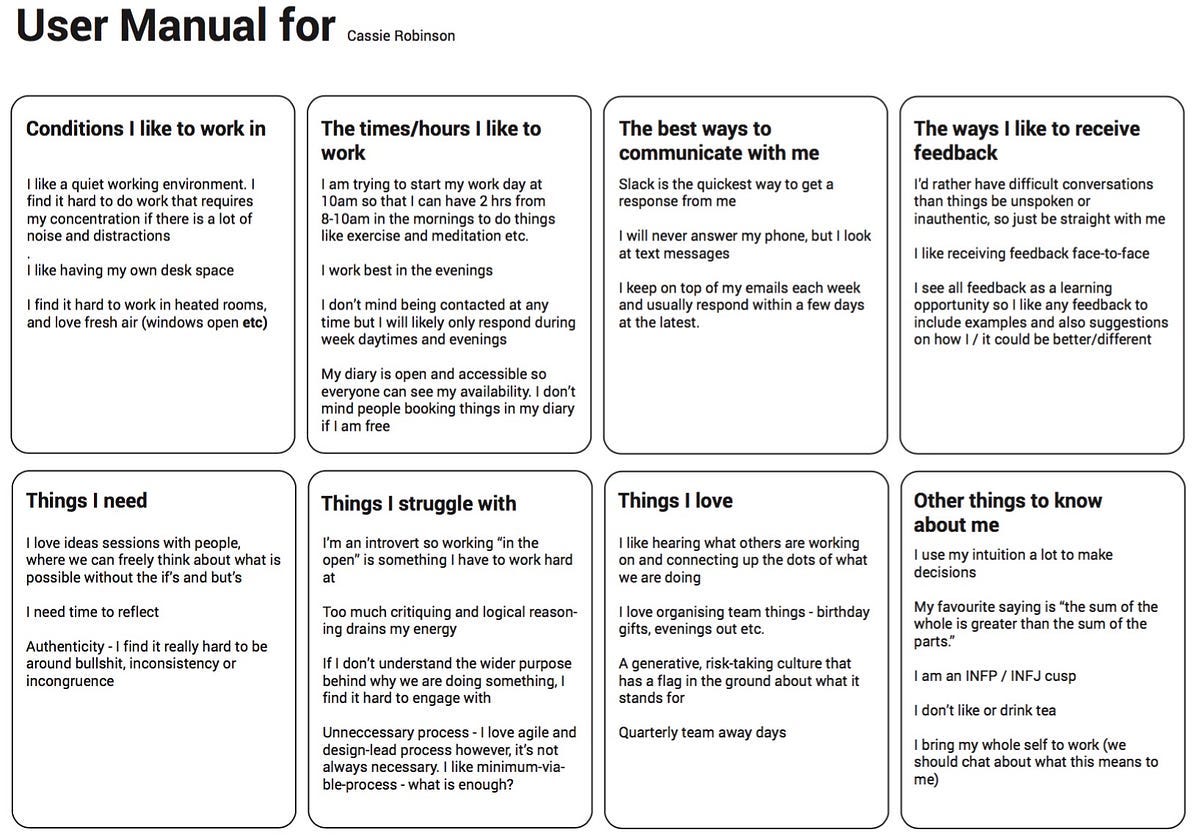How to Succeed in Your New Job Without Dying (Part 1)
5 things to do during your first 30 days
Congrats on your new job! 🎉 As a recent grad or early-career professional, starting out can feel both exciting and overwhelming. Here are five tips for your first 30 days to set yourself up for success in your new role.
1. Embrace your place
It’s natural to feel impostor syndrome, but remember that you got this job (over many other candidates) for a reason. Your skills, experiences and potential have earned you this opportunity. If anything, a [healthy] amount of impostor syndrome is a powerful motivator and precursor to growth:
If you got the offer, there are already people at the company who believe in your ability to succeed. Reconnect with people who helped you in your job search — especially your employee referrers, mentors and interviewers you clicked with during the recruiting process. They are your first “career champions” at the company and are invested in your success.
While it's tempting to assess your progress against others, refrain from comparing your Day 1 to someone else's Day 1,000. If you find yourself intimidated by your colleagues, turn it into a networking opportunity by reaching out for coffee and learning from their experience. Trust in your ability to grow into your role, and know that you bring something that nobody else brings: your unique, fresh perspective.
2. Take it slow
News flash: nobody expects you to add value on Day 1. In fact, most people will see you as useless for the first several weeks (maybe even months) in your role.
This is a good thing.
While you might be eager to hit the ground running, resist the urge to start executing right away. Worst case scenario, you’ll be sprinting to action without full context on what it takes to do your job well. Best case scenario, you’ll knock it out of the park and set unrealistically high expectations for yourself as an employee, leading to an unsustainable workload.
Take your time to get acquainted. By the end of the first 30 days, you should (at the minimum) be familiar with:
Your company’s and team’s mission and priorities, including Objectives and Key Results (OKRs)
The (1) product or service that your company sells, (2) who they sell it to, (3) why they buy it, and (4) how your company makes money
Your team’s “rhythm of business” — how they prioritize, plan, communicate, collaborate and make decisions
Your company policies, org structure (“who’s who?”) and your specific job responsibilities
3. Ask for help — thoughtfully
As you onboard, you’re bound to have a lot of questions. Don’t wait until you’re drowning to raise your hand. Now is the time to ask them!
It’s in your team’s best interest to get you up to speed ASAP, so there is no such thing as “dumb question.” There are, however, better ways to ask for help than others.
Instead of pinging your manager every time you need help with: “hey, can you help me with X?” ask or “shadow” someone in the same position as you first. Senior people are busy and less likely to be helpful with the tactical day-to-day of your role:
If you have a ton of questions, write them down to go over with your manager or a “buddy” later so you’re not constantly pinging them with questions.
In addition, reframe your question to share context around what you’ve tried. This helps them help you and showcases your resourcefulness:
“I first checked resource A and B, and I’ve also spoken with [buddy] and together we’ve tried C. We still weren’t able to resolve the problem — is this something you could help me with?”
If your onboarding experience isn’t smooth, it’s usually not your fault. At many companies, information is scattered across many different places, out of date, or living inside people’s brains. As long as you’ve done some digging, don’t spin your wheels for too long.
4. Set expectations with your manager
For better or worse, your relationship with your manager will make or break your experience and trajectory at the company. However, managers are people too! It’s in their interest to support your growth, as this will enable both of you to succeed.
Schedule a 1:1 to get to know them, learn their management style, and align on expectations for your role. Instead of diving into “work stuff” right away, take a genuine interest in getting to know them as a human being. Questions to ask include:
“Tell me about yourself. What inspired you to join this company and role? What are your personal goals?”
“What are your priorities and pain points?”
“What behaviors or outcomes define a ‘stellar job’ for someone in my role? What about a ‘mediocre’ or ‘bad’ job?”
“What is your preferred communication style, format and cadence?”
“What is your philosophy around feedback? What can others expect in receiving feedback from you? How would you prefer to receive feedback from others?”
“How would you define success for me specifically in this new role? What goals do you have in mind for me, and in what timeframe?”
“How can I make your life easier?”
Managers: I recommend having each team member (including yourself) complete a User’s Manual / User’s Guide to Me. This exercise helps everyone understand how each person operates and is a proven preventer of anxiety, headaches and conflicts between working styles.
5. Start building bridges
If you thought networking ended once you got your offer, you’d be mistaken. Relationships are critical not just for exploring and landing jobs, but for advancing within a company too.
Schedule a 1:1 with every seat that touches yours, including teammates, managers, and cross-functional stakeholders. Like before, get to know them first as a human, then as a colleague. You never know whether you’ll need their help (or vice versa), and having a pre-existing relationship will make working together much easier.
Here are some questions to ask in your 1:1s:
“Tell me about yourself. What inspired you to join this company and role? What are your personal goals?”
“What are your priorities? What are you working on right now?”
“What’s one thing we could do better as a company or team?”
“What advice would you give to new hires in my position?”
“What are some best practices for collaborating with someone in your role or department?”
“Is there anyone else at the company you recommend I meet as I get up to speed?”
Aim to meet at least 1 new person a week, and write their name down with notes from the conversation in a notebook or spreadsheet after your chat. Here is the “Networking database” template I use for my own network (make a copy). You’ll be thankful that you can reference these notes in the future!
In summary: breathe, and let it soak it in!
You only get one chance to be “new.” While it may feel intimidating, your first 30 days are one of the most exciting times in your journey. By focusing on learning the ropes, aligning on expectations, and building relationships, you’ll make the most out of your “newbie” status set yourself up for success in the future.













This is awesome. Exactly what you need if you're an introvert (like me). Keep doing what you're doing Miss Hu. Wow!
This guide is such a goldmine for anyone entering new roles! Wish I had these a few years ago - are we getting a part 2 anytime soon?